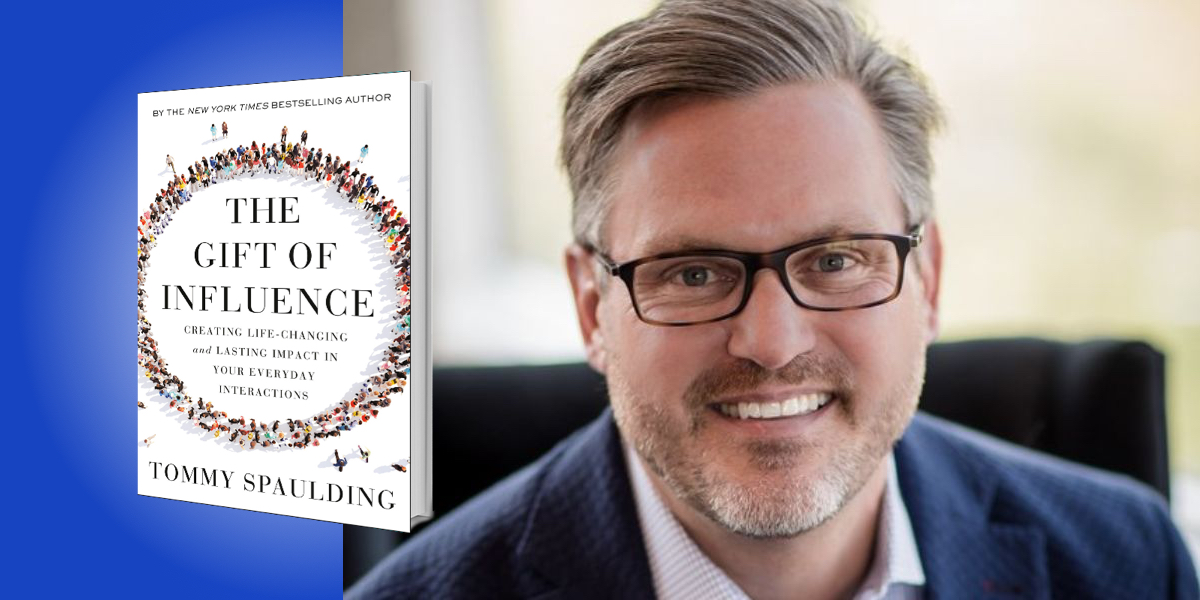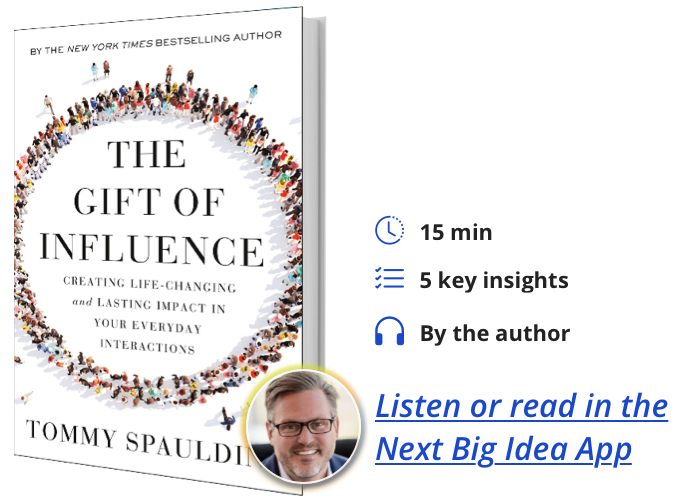Tommy Spaulding is the founder and president of the Tommy Spaulding Leadership Institute, a leadership-development training organization based in Denver, Colorado, and the New York Times bestselling author of It’s Not Just Who You Know and The Heart-Led Leader. The former president and CEO of the global leadership organization Up with People, Spaulding consults, trains and speaks to more than one hundred businesses and organizations across the country each year.
Below, Tommy shares 5 key insights from his new book, The Gift of Influence: Creating Life-Changing and Lasting Impact in Your Everyday Interactions. Listen to the audio version—read by Tommy himself—in the Next Big Idea App.
1. The Mrs. Lynn story shows the power of positive influence.
There was an eighth grade algebra teacher named Mrs. Lynn, who taught in a little town outside of Lincoln, Nebraska in the early 1960s. It was a Friday afternoon, the last period of the day before spring break. Thirty-six students walk into class and the kids were bouncing off the walls, so she knew that no algebra would get through to them that day. Instead, she told everyone to take out a piece of paper and she wrote all 36 students’ names on the chalkboard. Every student was now to write a kind word for each name. After class, she transcribed the answers so that every kid got a piece of paper with 36 beautiful words that their classmates said about them.
As she passed the papers out the following Monday, Mrs. Lynn marveled at the reactions of these eighth graders while they read their great words. Some kids cried, others chuckled. It was a beautiful exercise and Mrs. Lynn never brought it up again.
Fast forward to the mid-to-late 1960s, and Mrs. Lynn got a phone call that one of her former students was killed in the Vietnam War. It was Mark, one of her eighth-grade algebra students who went on to high school and became quarterback of the football team before getting drafted. He was the first fallen soldier from this small town, and Mrs. Lynn attended the funeral. She was invited back to Mark’s house to continue celebrating his life. She was in the kitchen eating sponge cake when Mark’s father walked up and asked, “Are you Mrs. Lynn?” She said yes, so he requested, “Do you mind following me? There’s something I want to give you.”
Mrs. Lynn followed Mark’s father back into Mark’s childhood bedroom. She scanned over the football trophies and pictures of famous quarterbacks, but then noticed a foreign object on the bed that gave her shivers. It was a camouflage infantry helmet. Mark’s father picked it up and said, “This is what I want to give you.” She was confused, so he told her to turn it upside down. There, tucked under those rubber bands that hold a war helmet to a soldier’s head, was a six-year-old yellow, stained, Scotch-taped, crumpled piece of paper. She pulled it out and recognized her own handwriting: Mark, followed by 36 great words about him. Mark’s father said, “My son loved this piece of paper, carried it wherever he went. When he was found killed, that piece of paper was tucked under his war helmet. You had a huge influence on my son.”
2. Every day we have an opportunity to make an influence.
When I first heard Mrs. Lynn’s story, I knew that I wanted to live a life like hers. I wanted to impact lives every day. I had heard the statistic that the average human being lives to 78 years old, and the average person influences up to 80,000 people in their life. If you take 80,000 people divided by 78 years, divided by 365 days, you get 2.8 people. Every day, from birth till death, we meet 2.8 new people a day, 80,000 people in a lifetime—that’s a lot of people.
“At the end of your life, imagine walking on the 50-yard line and gazing around at every single person that you’ve met.”
What if at the end of life, we got to meet every single person that we’ve influenced positively or negatively? What would that look like? Where would they fit? They’d fit in football stadiums. There are hundreds of football stadiums around the world with exactly 80,000 seats. Pick your football stadium. At the end of your life, imagine walking on the 50-yard line and gazing around at every single person that you’ve met: the barista at Starbucks, the Uber driver, the new neighbor, the new employee, the customer, the client, the coach—all 80,000 people that you’ve influenced are in that stadium to say goodbye.
What’s the sound of that stadium? That sound is your legacy. Are they pounding their feet and giving you a standing ovation? Are they clapping and screaming your name because you had a huge influence on them? Or are they booing because you spent your whole life thinking about yourself, and not serving others? Or even worse, is the stadium silent because you spent your whole life looking down at your phone and not looking up at the people in front of you?
3. Run towards pain.
When someone’s going through a tough time, be it depression, financial trouble, divorce, struggles with their child, or some sort of pain, how many times do we say, Hey, I’m so sorry for what’s happening to you. If there’s anything I can do, let me know? We say those words all the time, but what we’re really saying is, I don’t really want to do anything, but I want to be polite and make you think that I want to do something. These words are said knowing full well that the person in need will never call to say, You know, there is something that I want you to do.
It is the most transactional, insincere thing to say. When someone is going through a tough time, it’s better to say something like, Hey, I know this situation is tough. My wife went through it, and I know how painful it is. I have a great book that I want to give you. Can I bring it over tomorrow? Tell the person what you want to do for them. Show, don’t tell, that you want to help.
4. Don’t walk on by.
We have a chance to meet 2.8 people a day. Technically we can meet hundreds of people every day, but we walk on by all the time. Just the other day, my wife and I dropped off our 14-year-old son at boarding school. I never thought in a million years that my son would go to boarding school. I didn’t grow up with that. My parents were public school teachers, but my son plays hockey and he’s one of the most elite 14-year-old players in the country. So, he was asked to play for Shattuck-St. Mary’s, which is the number one hockey prep school in the country.
“I’ll probably never talk to her again, but she’ll be in my stadium because I didn’t walk on by.”
I didn’t want to cry when saying goodbye because I wanted to be strong for him. I didn’t want to cry in front of my wife either. So, we just said our goodbyes, got in the car, and my wife and I drove back to the airport where we had a glass of wine and a little lunch. She headed off to the gate while I stayed back to pay the bill. As I was walking to the gate, I passed a Caribou Coffee shop. There was a young woman at that Caribou Coffee, bawling her eyes out in plain sight while writing a letter. I just walked by her and went on to my gate.
But at the gate, I had the urge to turn around because that young lady could be one of my 2.8 people that I was supposed to meet, who might be in my stadium the day I die. I walked right back to Caribou Coffee. I grabbed a chair, sat down, and said, “You having a rough day?” She looked at me and started crying. She said, “Yeah. I’m from London and my boyfriend’s from Minneapolis. We have this long-distance relationship. It’s not working. I’m writing him a goodbye letter, and it’s painful.” I told her that I just dropped my 14-year-old son off at boarding school, I’m missing him, and in pain too.
I started crying. Before I knew it, I’m giving her a hug and we were crying together. I never got this lady’s name or contact information. I’ll probably never talk to her again, but she’ll be in my stadium because I didn’t walk on by. I walk towards people going through a tough time.
5. The three questions.
I was at a dinner party, years back, and sat next to a woman who was a hospice nurse going on almost 40 years. I was amazed by her. She has helped thousands of people pass on. I said to her, “I helped our grandfather at the hospice get to heaven, but I’ve only had that one person die in front of me. What’s it like having thousands of people die in front of you?”
“If we know the questions that we’re going to ask at the end now, then why don’t we start living those questions every day?”
First, she said, “Well, it’s a sad job because a lot of these people are alone. I take my job very seriously, making sure I comfort them, that they feel valued before they die.”
But the second thing she said blew my mind. She said, “They all ask the same three questions. Doesn’t matter what color skin you have or religion, what political party, what you do for a living, where you live in the world, but all the people I help get to heaven, the thousands of people, they all ask the same three questions: Was I loved? Did I love back? And did I make a contribution?”
Was I loved? Did I love back? Did I make a contribution? If we know the questions that we’re going to ask at the end now, then why don’t we start living those questions every day? The word influence has been hijacked by social media and marketing geniuses. According to them, a true influencer is measured by how many likes you have or how many tequila bottles you can sell through your content. I want to hijack that word back. To be a true influencer is waking up every morning and having a positive influence on the lives of others, investing in people, turning around and hearing their stories, and making them become better human beings with your love, support, friendship, and mentorship.
I hope to inspire people to live life differently, lead differently, love differently, and look at life as an opportunity to meet 2.8 people every day. And at the end, there will be 80,000 people in the stadium screaming in gratitude for the difference that you made in their life.
To listen to the audio version read by author Tommy Spaulding, download the Next Big Idea App today:
































